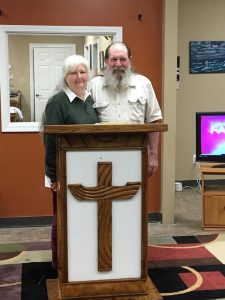My Philosophy of Ministry
(I understand that this is about my ministry outreach but my husband and I are partners in our ministry, so I use both of us in some areas of this paper.)
 For many years, I have felt invisible or forgettable as a young child, I always felt as if most folks couldn’t really see me, or hear me; if they did, they soon forgot. This increased as I became a teenager- my goal in high school was to get from one class to another without anyone speaking to me. I hated the idea of anyone calling my name out because I didn’t want any attention brought to me at all. I think this was caused by the thought that NO ONE knew who I was, so if I prevented them from seeing me, I would never have to be called out by someone saying loudly Who are you?
For many years, I have felt invisible or forgettable as a young child, I always felt as if most folks couldn’t really see me, or hear me; if they did, they soon forgot. This increased as I became a teenager- my goal in high school was to get from one class to another without anyone speaking to me. I hated the idea of anyone calling my name out because I didn’t want any attention brought to me at all. I think this was caused by the thought that NO ONE knew who I was, so if I prevented them from seeing me, I would never have to be called out by someone saying loudly Who are you?
The culmination of this was when I worked at the local deli; I was required to wear a hairnet. Since we live in a very rural area, with a low population, most people know me, if not personally, at least by my face; my husband has been a fairly publicly known person for most of his adult life, so that carried over onto me. I was surprised to see how many people who should have seen me for who I was, never made eye contact with me; they simply placed their order and I filled it. If I were to greet someone by name, they always seemed surprised to see they actually knew the person behind the counter
I realized after a few weeks that it was not me personally who wasn’t recognizable, but that there is an entire group of people who are invisible. Anyone who works or serves the public: wait staff, grocery store clerks and cashiers, gas station attendants anyone who works with the public in a service position is very likely to be a part of this people group. After God revealed this to my husband and me, we set out to make a difference to these folks, so we consistently look for a way to recognize the person behind the name tag. Where possible, we call them by name, or otherwise speak personally to them; instead of ” have a good day”, we might say I hope the rest of your day is good, and you have a nice evening. If their uniform allows them to wear something that tells us about them, for example, a football team logo- we try to mention that. But in whatever way possible, we try to make a personal connection to them, to let them know that we see them for who they are a person with a family and friends, who has good days and bad days. We have had the opportunity to offer prayer for them, when they seem to be burdened and are able to share with us.
Another people group that I am drawn to is small children, especially those up to about middle elementary school. They are notoriously not seen as people, but as accessories to whichever adults, they are with. I am fortunate to be able to spend time with several young children, who keep me up to date with the TV shows and characters they like I am able to use this (with the parents or other adults permission of course) to reach out to the child and have a short conversation with them. This may be as short as asking if they watch Paw Patrol, or like to play Minecraft. Because the child recognizes that I can see them as a person, I can many times connect to them and let them know that we care about them, who they are and what they have to say. That simple connection will open doors to be available to them when they need prayer or just to talk to a non-judgmental adult who may be able to help them.
The third group is bikers- these are people my husband and I love and want to reach for Christ. My husband has ridden since he was a teenager, and I’ve been riding for about 10 years.
There are a few things that are important to bikers as a group: intense love of family and the importance of family structure and wholeness; safety and respect of children; the right to privacy, even though their activities may be outside the limits of the law; and the right to live as they see fit, whether its what others deem right or not.
For the most part, we are accepted by those in the biker culture; they see that we have respect for them as clubs, and as individuals. They know we don’t judge them, even though they live outside of the norms society expects. In fact, I believe they see that we too do not live inside the lines that most normal people expect. We have worked hard to show them that we love and respect them. They know that we know they don’t need us, they don’t have to accept us. But they have chosen to allow us into the edges of their lives.
Two things that have caused us to be allowed into their world: our youngest daughter has married into a family of bikers and because she loves them, and shows them respect, they love her and are learning to love us as well. The second thing, that seemed fairly insignificant at the time, was that our daughter’s father in law asked us to take over hosting a toy run he started in 1990. He’s no longer able to keep it going because of his job, so he asked us. We have taken it, and are trying to build it up to the biggest in the state, but we made sure we left it under his name. He seemed surprised by that act, but we couldn’t have changed the name it was his and it will always be his. We had a logo created using his likeness, and had mugs made up with the logo on it- we gave one to him, and he was very touched. This one simple gesture (which I know now was led by God) has caught his attention, as well as the members of his club.
In giving this somewhat long explanation of what I believe my ministry areas are, I hope I have also given some insight into what my philosophy of ministry is
One section in the book covered dealing with people of other faiths when they are in need of a chaplain; it stressed that we are to show love and respect to someone, no matter what their faith is; that we aren’t to try to convert them to Christianity, but to simply be there for them and be present for them in their needs. (That phrase, ministry of presence caught my attention immediately and has stayed with me through this study.)
But that part of the material also caused me the most struggle of this entire book- I know God has called me to share His love to everyone around me, and I had to work through how I could do that, while listening to someone from another faith and validating their belief systems; how can I as a Christian, not share Jesus with anyone I come in contact with? By working on through the chapters of the book, I know now that God will give me the strength to do what needs to be done, and He will give me the right words to say when the time comes. There may be times when I cant share the gospel immediately. Everyone won’t be ready to hear the Good News, to begin with; as I’ve learned in working with bikers, until they know that I care, they don’t care what I know.
So, while I fully intend to do anything I can to share the gospel with everyone I come in contact with, I have learned that I need to depend on God’s timing on when I share the gospel.
While each of us has been challenged to share with everyone, He has given me three groups of people to focus on sharing the Gospel with:
- the invisible people who serve us in society need to be shown that God values them as individuals, no matter how low, grubby or insignificant their jobs seem to be, or make them feel. Because they do serve society, they have a servants heart, and part of my job is to show them that God loves them, because He has a servants heart
- the children of this world who are invisible, simply because they are young and most people dont recognize they can make a valuable contribution to the world around us, even if its not what some people see as important
- people who are a part of biker culture because they too seem to be invisible. Their invisibility comes because most of society sees bikers as Sons of Anarchy types who are scary, bad guys – so the best thing to do is just not even make eye contact, much less speak or show love. They are not short of people to show them love- but they sometimes are short of someone to show them God’s love. Our job will be to love on them, so when they do need prayers or emotional support, they know they can call on us to step up and remind them that God loves them and so do we.
So, my philosophy of ministry is that as I walk through each day, I have to stay in a mindset, through fasting and praying and Bible study, that I am able to talk with anyone, no matter their faith. I will not argue about their faith or mine; I can’t try to make points to win them over. I must be available to listen when they need to talk. When they need prayer, I will pray for them, to my God of course, but in a non-threatening way. When they need just to have someone sit with them quietly, I will sit with them. If they need someone to cry with them, I’ll do that too. Ill work towards just being present with them when they need it. My husband says that he and I have “talk to me faces”. I believe God has given us kind faces that let those around us know were willing to listen.
My ultimate goal as a chaplain is to have anyone within arm’s length of me realize that I am there for them when they need it, no matter what

